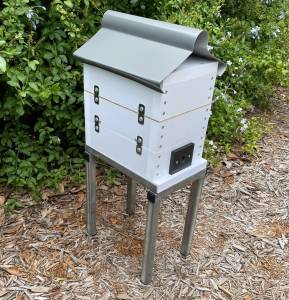Unfortunately due to popularity all spots are now taken for 2026, but please if you would like to go on the waitlist for the 2027 program please send us your contact details and location.
Beehive Babysitting
Want to have a beehive in the backyard but don’t want to have to deal with managing the bees. Our beehive babysitting program might be for you. We keep ownership and manage the hive and you get to enjoy the benefits of having bees in the backyard.
More detailed information
Our intention for offering this service is to diversify our colonies foraging environments, to better understand how various factors effect colony health and to raise awareness of native bees in all environments.
Please note: The hives and colonies remain at all times property of ABeeC Hives. Propagating the hives by any means is prohibited e.g. splitting, budding, eduction as is opening, tampering with or moving the hive.
During times of extreme weather eg. Fire, flooding, heat wave we may need to gain access to the hive/s in order to maintain welfare of the colony. We will endeavour to contact you as these events occur.
We reserve the right to remove the hive/s from the property at any stage.
If you are moving house, please give us four weeks notice so we can arrange the movement of the hives.
Please liaise with us before any pest or weed spraying in the area is to occur. Incorrect use of these products can result in death of the colony.
Also, if you have a vegetable / fruit garden just watch how much your yield increases with the free pollination service of the bees so close to your garden.
About The Bees
- Stingless native bees as in the name do not sting but they can bite. Native bees are not aggressive and will not actively bite if you are close to the hive. Biting will usually only occur when opening the hive if splitting or inspecting the brood. The bite is not very painful and can be similar an ant bite. This makes them child and pet friendly.
- The bees are classed as social bees and live together as a colony with a single queen that lays new eggs, called brood.
- The bees are subtropical so they like the warm weather. You will notice if the temperature is below 18 degrees the bees will not leave the hive. During the winter months they will often not start to forage for food until late in the day. In extreme weather 42+ degree days the bees do not do too well and can die off.
- Bee GPS – Native bees have a very strong internal navigation system. Moving the hive more than 50cms can cause the bees to get lost and not find the hive again.
- I see the bees leaving with small round brown balls. This is just the bees waste disposal system. Rubbish is collected by the bees, taken outside the hive and disposed of.
- Link to full list of Native Bee FAQ’s
Currently We Are Servicing The Below Suburbs
- Alexandra Hills
- Birkdale
- Capalaba
- Cleveland
- Mount Cotton
- Ormiston
- Redland Bay
- Sheldon
If you are not in one of the areas that we currently service for beehive babysitting but want to be added to out waitlist, please send your contact details to info@abeec.com.au.

Contact details to register
Phone – 07 3206 0552
Email – info@abeec.com.au
